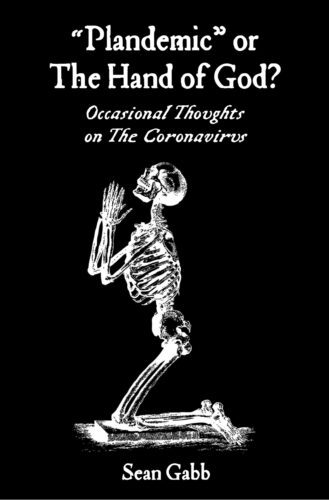Sean Gabb recently published a collection of essays written during the lockdown for Wuhan Coronavirus. This excerpt is from the introduction to “Plandemic” or The Hand of God?:
My general argument is that the Coronavirus Panic should be divided under two headings. The first is the Virus itself as a medical fact and the immediate responses. The second is a set of changes already evident and sometimes advanced before the March of 2020, but that have now been greatly accelerated. Of these, the second is by far the more important. The first, even so, is of interest in its own right.
The Virus has not been all that we were told it would be. Last March, much of the world was ordered into indefinite lockdown on the grounds that we faced the greatest pandemic since the Spanish Flu of a century ago. For weeks in my own country, the BBC filled the television screens with statements by scared, sweating politicians, and lifted all restraint from its own hyperventilating staff. Now, as I write in the middle of September, we can be sure that it killed no more people than a seasonal influenza, and that most of its victims were very old or had been already weakened by some other condition. We can be sure it killed no more than seasonal influenza. Given the questionable definition of Coronavirus deaths, it may have killed many fewer.
I know that pandemic infections often come in several waves, and second waves can be more deadly than the first. But the second wave we are now said to be entering is evidenced by infections rather than deaths, and these infections are counted and published in ways more questionable than the counting and publishing of the earlier alleged deaths. I do not know what will have happened by Christmas. I suspect, however, that nothing much will have happened.
I have no fixed idea of what caused the panic. I am told that the Coronavirus was a bioweapon that escaped from a government laboratory. If it was, I can imagine that political leaders all across the world were taken aside by their own scientists, who were working on something similar, and told of the coming apocalypse. I lack the scientific understanding to judge the truth of this claim. But, if true, it would explain the panic. It would also justify the panic, so far as no one might have known for sure how infectious and how deadly this bioweapon was.
I am more inclined, though, to believe that the panic was a universal hysteria just waiting to be realised. The world at the beginning of this year was in a similar moral state to the world in 1914. There had been a generation of rising prosperity and of rising discontent. Some groups had benefitted out of proportion to their numbers and believed merit. If only relatively, others had fallen behind. Some believed the progress had not been fast enough, and that it could be hastened by various institutional changes, others that it was bad in its effects, and that it should be at least slowed. In 1914, all these discordant energies were channelled – both by deliberate policy and by popular enthusiasm – into a catastrophic war. This year, they found their outlet in the Coronavirus. Since I am making the same point, I might as well quote Marx:
Hegel remarks somewhere that all great world-historic facts and personages appear, so to speak, twice. He forgot to add: the first time as tragedy, the second time as farce.
I will only add that, on the real stage of world affairs, farce is always preferable to tragedy. Facemasks are better than gasmasks. Better the statistical mirage of last spring than the genuine casualties of Verdun and the Somme.




